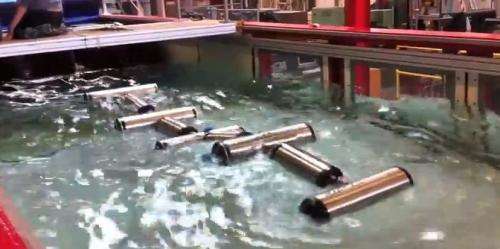September 15, 2013 weblog
UK Dyson Award picks wave power generator

(Phys.org) —The wind generates sea waves and that energy has scientists interested in how to harness that power, in a field called wave energy. Harnessing energy from the waters has the potential to be an exceptionally environmentally benign form of generating electricity, energy generation sources in the mainstream energy production industry but just how remains an area of exploration. According to BBC News, some wave power approaches present limitations because they only work best when waves travel in one direction, and are less efficient in turbulent seas. Enter the Renewable Wave Power (RWP), a multi-axis wave power generator that performs well under any sea conditions, and which has picked up the UK round of the James Dyson Award. This is an international design award, presenting cash prizes, to promising next-generation design engineers. The RWP picked up the UK award and its next round will be the international finals.
RWP is defined as a semi-submersible multi-axis wave energy converter, specifically designed to run in the Orkneys, in Scotland.
The RWP device can absorb forces from "peaks and troughs" of the North Atlantic waves in any given direction. That ability to leverage the forces of waves no matter which way the water is churning is what has attracted much attention. The creator is Sam Etherington. He has found that "It is better to work with the forces than to repel them."
How does it work? A long chain of loosely linked pistons draw power from the tidal waters that flow unpredictably. Energy is generated as the chain flexes in high and low points of each wave. As part of the project, data was taken from buoys moored in the Orkney Islands and used to make waves in a water tank at Lancaster University.
RWP has gone through multiple simulations and CAD iterations. Etherington said the device was partly inspired from his experiences kite surfing and sailing off the coast of Cumbria in Northwest England, where he saw how waves in the sea did not often travel in a predictable way. He was also reminded of the sheer power of waves and their potential to generate energy. Writing in Made in Brunel site of Brunel University in London, where Etherington studied mechanical design, he commented on his motivation to start the project.
"It seems like an enormous waste to not use all this natural power that's available all the time every day. We only use about, less than a percent of the available resources around the UK anyway so given that we need extra electricity over the coming years it might be something interesting to explore."
Further tests are planned to demonstrate his device's efficacy. Commenting on the device's future, Dr. David Forehand of the Institute for Energy Systems, a research institute in the engineering school at the University of Edinburgh, told BBC News that "The real test for a device is its cost of energy."
More information
www.bbc.co.uk/news/technology-24070071
madeinbrunel.com/stories/view/sam-etherington
© 2013 Phys.org



















